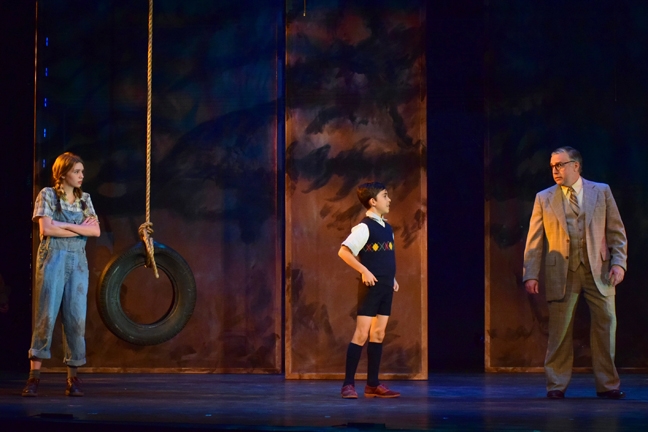KALAMAZOO – It’s slightly jarring to see the Kalamazoo Civic Theatre mainstage completely exposed as director Todd Espeland’s “To Kill a Mockingbird” begins: At first, there is nothing on the stage except a dozen or so empty chairs.
A tire swing drops in, joined by seven narrow scrims that form a dark, hazy, stage-spanning tree, its tangled branches looking as if they were painted on wet paper with India ink and calligraphy brushes.
There will not be much more added to the scene as the play progresses: No homey front porches, eerie decrepit houses or dusty streets to conjure up the Alabama hamlet of Maycomb in 1935. Instead, Espeland counts on his actors to draw us into Christopher Sergel’s adaptation of the Pulitzer Prize-winning Harper Lee novel. The gamble pays off.
Espeland’s sparse setting underscores that this is a story drawn from memory, and that in our memories people and words often register more clearly than backgrounds. Our guide is the grown-up Jean Louise Finch (Mary Teutsch, radiating warmth and a bit of wistfulness), reminiscing about the summer in which the sun was not the only thing raising temperatures in town. In 1935, Jean Louise is still the tomboyish Scout (Sara Verduzco), the sometimes rambunctious daughter of lawyer Atticus Finch (David Noyes).
Atticus is attracting plenty of attention — most of it hostile — for defending Tom Robinson (Rob Bradford, in a compellingly modulated characterization), an African-American man accused of raping a 19-year-old white woman, Mayella Ewell (Stefani Bishop).
Although Jean Louise remembers Maycomb as “a tired old town,” it seems like there’s potent drama around every corner, thanks to Mayella’s disreputable and possibly demented dad, Bob (Ron Dundon) — “the only man ever fired from the WPA for laziness,” jokes Jean Louise — would-be lynch mobs, judgmental gossip-mongers and the mysterious recluse Boo Radley (Kevin King), who “eats raw squirrels (and) whatever cats he can find,” according to Scout’s older brother, Jem (Hayden Lane-Davies). Radley never shows his face in public, much to the dismay of Scout, Jem and their visiting friend, Dill (Taye Bradford).
Compressing Lee’s beloved book into two acts is somewhat tricky, and there are points at which we feel Sergel pushing the plot along without leaving quite enough time for nuance and atmosphere. Even so, the actors never short-change the material. Although any actor who steps into the shoes of Atticus Finch risks unfavorable comparisons with Gregory Peck’s Academy Award-winning portrayal of him in the 1962 film, Noyes wisely undersells Atticus’ noble nature, painting him instead as an enlightened man who is brave enough to follow his conscience, despite the disapproval of his neighbors.
This Atticus does not seem to descend from the heavens as some sort of flawless beacon of morality; instead, he’s credible and accessible, a guy trying to balance his passion for justice with the challenges of being a single dad with kids who rarely obey his orders. Verduzco and Lane-Davies are wonderful and thoroughly engaging as Scout and Jem, capturing the vitality and curiosity of children who are just becoming old enough to realize the world is not always pretty and pleasant.
Dixie Edwards and Allison L. Crockett strike the right comic notes as two of the town’s chattiest, most opinionated matrons, while the towering Kevin Oberthaler uncovers surprising sensitivity in Sheriff Heck Tate. Practically oozing menace and viciousness, Dundon does an exceptional job of showing us the worst that Maycomb has to offer, and Bishop turns the white-trashy Mayella into a prickly, ultimately-pathetic spitfire, whose feelings betrayed on the stand by her darting eyes, jittery knees and constantly twisting fingers.
Lighting and sound designer AnnMarie Miller and scenic designer Ryan Fox create wonderfully effective ambience, particularly with the startling cherry-colored wash and burlap-like texture that flood the back walls during the trial scenes, and the creepy deep-blue shadows that engulf Jem and Scout during a tense walk through the woods during a thunderstorm.
The emotional fireworks and thought-provoking themes of “To Kill a Mockingbird” can tempt some directors to go to ill-advised extremes, but thankfully Espeland and his team opt for subtlety and tastefulness instead of Great American Novel razzle-dazzle.
To Kill A Mockingbird
Kalamazoo Civic Theatre
329 S. Park St., Kalamazoo
Feb. 17-March 4





